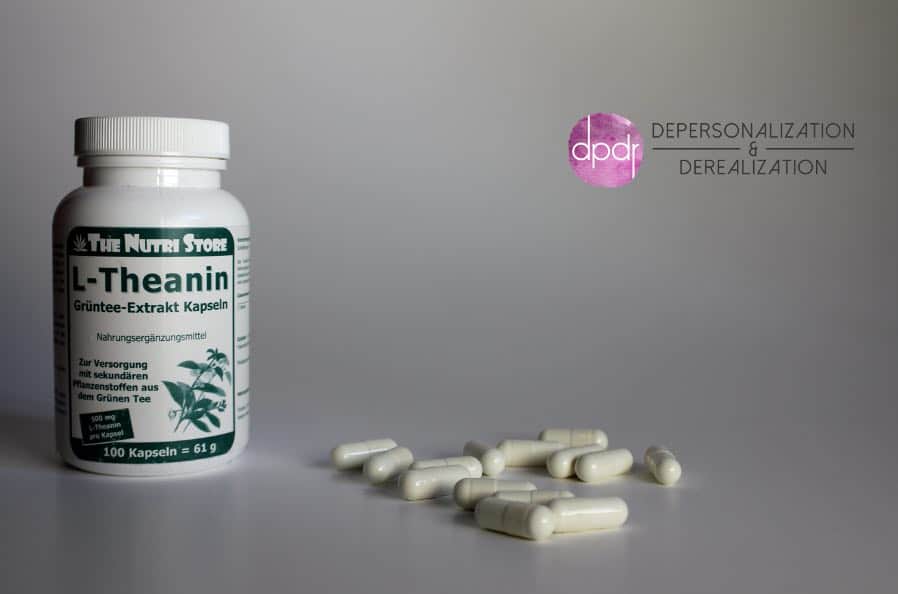A main cause of depersonalization derealization disorder are high anxiety levels. In the 2019 study Filipe Lopes Sakamoto investigated the effects of L-Theanine on mental illness [1]. The study showed that, at doses of 400mg/day, L-theanine has a calming effect in patients experiencing high anxiety.
During my worst DPDR phases, the only thing that seemed to keep me from losing my mind, was drinking one cup of green tea after the other. One of green teas main compounds is L-Theanine.
Why Is L-Theanine Relevant for DPDR?
Many supplements and vitamins have a relaxing effect. They emulate a natural innate state of happiness; among these, L-theanine stands out as a promising treatment to reduce high anxiety levels.
Following are the two processes that occur in the body after L-theanine intake that are benefical for your DPDR symptoms:
- Alpha brain waves are stimulated and increased, which has been shown to decreases anxiety in humans [2].
- L-theanine is turned into glutamate, and as such can pass through the blood brain barrier, where it increases your GABA levels.
- GABA is an inhibitory neurotransmitter, and when it attaches to the GABA receptors, you start to feel more relaxed [3].
- GABA also effects neurotransmitters, e.g. dopamine increases and seretonine decreases with increasing GABA levels [4].
Research that Suggests a Link Between L-Theanine and Mental Health
| Source | Key Result | How is this relevant for DPDR |
| [1] | At doses of 400mg/day, L-theanine has a calming effect in patients experiencing high anxiety. | Tons of DPDR sufferers, including myself, link depersonalization to anxiety, thus research concerning anxiety disorders is a promising place to look for answers as long as research on DPDR is still insufficient. |
| [4] | Studies using electroencephalographs (EEGs) have shown that L-Theanine has a direct impact on the brain. | During my 24/7 DPDR experience, my brain felt numb and empty. Anything creating some feeling, dynamic or change in the brain is welcome. |
| [6] | L-Theanine promotes relaxation without causing drowsiness and, at the same time, boosts mental focus. | DPDR is linked to anxiety on a consistent basis. Also, a major step towards recovery is focusing on other tasks with out obsessing about your DPDR. |
| [4] | The release or reduction of serotonin or dopamine can be significantly altered by the intake of L-Thenanine. | Serotonin and dopamine are neurotransmitters, which have a large impact on the way you feel. |
| [2, 5] | L-Theanine increases alpha brain wave activity which correlates with feelings of ‚relaxed-alertness‘. | Again, DPDR is often linked to high anxiety. Also DPDR suffers state difficulties to focus. |
| [2] | L-Theanine increases GABA production, and higher GABA levels make you feel more relaxed. | DPDR is linked to anxiety on a consistent basis. |
What is L-Theanine?
L-theanine (γ-glutamylethylamide) is an amino acid, which is an organic compound, or in other words a hydrocarbon compound, which are the foundation of all known life.
Where does L-Theanine come from?
L-theanine is commonly found in green and black tea [3]. It‘s also widely available as a supplement, just check amazon.
My DPDR Experience with L-Theanine
L-Theanine supplements as well as green tea decreased my anxiety and stopped my DPDR from getting out of hand, but when I felt my DPDR was fairly stable, taking a L-Theanine supplement didn’t seem to make me feel much different.
Conclusion – L-Theanine and Depersonalization
Though additional studies of L-theanine are needed to establish it as a possible treatment for patients with mental illnesses, its anti-stress, and anxiety-reducing benefits have proven to benefit many. L-theanine may be a reasonable choice that addresses certain mental illnesses. I can definitely recommend green tea or a L-theanine supplement to decrease extreme depersonalization or anxiety peaks.
Related Questions
Can Omega-3 Cure Depersonalization? A main cause of depersonalization derealization disorder are high anxiety levels. The sample size, in Lara Nataccis 2018 study on the effect of Omega 3 fatty acids and anxiety disorders [1], consisted of 12.268 adults. The study showed that with higher omega 3 intake as well as lower omega 6 / omega 3 ratios, the likelihood of an adult having an anxiety disorder decreased.
Want to find out how Omega-3 effects depersonalization? Check out the following post –> Can Omega-3 Cure Depersonalization (DPDR)
Does therapy cure depersonalisation? The day I got out of depersonalisation was after a day of therapy, so yes, therapy can accelerate recovery! Here are the 4 best therapies backed by scientific research and or my own experiences:
- Psychodynamic therapy
- Cognitive-behavioural therapy
- Acceptance and commitment therapy
- Integrated manual therapy
Want to learn more about the different types of therapy options then feel free to click the link –> Does Therapy Cure Depersonalization
References
[1] Lopes Sakamoto, Filipe, et al. “Psychotropic Effects of L-Theanine and Its Clinical Properties: From the Management of Anxiety and Stress to a Potential Use in Schizophrenia.” Pharmacological Research, viol. 147, Sept 2019, p. 104395, 10.1016/j.phrs.2019.104395. Retrieved on 7/30/2020 from: https://doi.org/10.1016/j.phrs.2019.104395
[2] Russ Mason.Alternative and Complementary Therapies.Apr 2001.91-95.http://doi.org/10.1089/10762800151125092 Published in Volume: 7 Issue 2: July 5, 2004
[3] https://www.healthline.com/health/gamma-aminobutyric-acid
[4] Juneja LR, Chu D, Okubo T, Nagato Y, and Yokogoshi H. L-theanine – a unique amino acidof green tea and its relaxation effects in humans. Trends in Food Sci. Technol. 1999;10:199-204.
[5] Hidese S, Ogawa S, Ota M, et al. Effects of L-Theanine Administration on Stress-Related Symptoms and Cognitive Functions in Healthy Adults: A Randomized Controlled Trial. Nutrients. 2019;11(10):2362. Published 2019 Oct 3. Doi:10.3390/nu11102362. Retrieved on 7/30/2020 from: https://www.mdpi.com/2072-6643/11/10/2362
[6] Nobre AC, Rao A, Owen GN. L-theanine, a natural constituent in tea, and its effect on mental state. Asia Pac J Clin Nutr. 2008;17 Suppl 1:167-8. PMID: 18296328
[6] Lardner AL. Neurobiological effects of the green tea constituent theanine and its potential role in the treatment of psychiatric and neurodegenerative disorders. Nutr Neurosci. 2014 Jul;17(4):145-55. doi: 10.1179/1476830513Y.0000000079. Epub 2013 Nov 26. PMID: 23883567.

